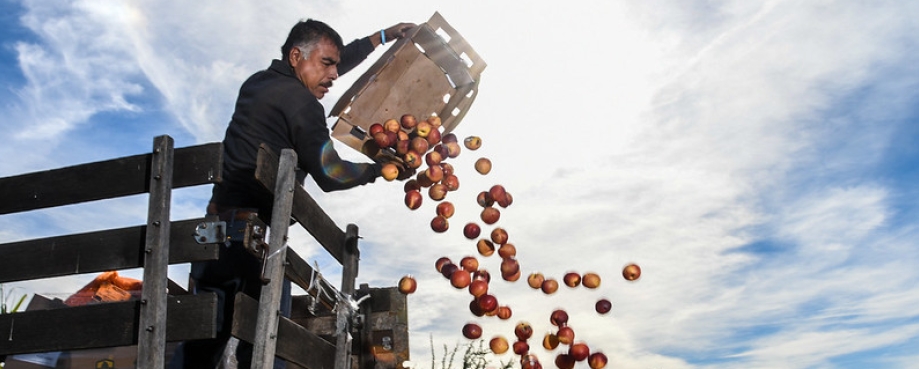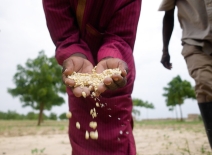
During London Climate Action Week 2025, in the auspicious surroundings of SOAS, University of London, ETI, IIED and Banana Link convened experts from business, trade unions, civil society, academia and policy to catalyse engagement on just transitions in food systems.
A rapid evidence review undertaken by ETI, IIED and Banana Link earlier this year confirmed a troubling hypothesis: the transition to sustainable agriculture in global value chains has so far neglected the implications for human and labour rights. The review revealed a shortage of published evidence on how shifts to sustainable agriculture practices are impacting workers. It is assumed that positive outcomes for the environment are accompanied by positive outcomes for workers and communities, but this remains an assumption, rather than an evidenced-based conclusion.
The purpose of the workshop was to discuss how human and labour rights might be impacted by green transitions in food, farming and fisheries, and to begin shaping a collaborative research and action agenda to fill this evidence gap as a priority.
The conversations were rich and wide-ranging, informed by expert interventions from academia, trade unions and companies. While this blog cannot capture the breadth and depth of the discussions, it surfaces key themes and issues raised, which require further investigation, investment and partnership.
Fishers on the front lines of climate change
Chris Williams, Fisheries Lead at the International Transport Workers Federation (ITF), brought the focus to the oceans - where climate impacts are already reshaping livelihoods and working conditions. Warming seas are pushing fish stocks further offshore, extending journey times and increasing risks in an industry already notorious for hazardous working conditions and long working hours.
Meanwhile, small-scale artisanal fishers face collapsing local catches, which in turn drives economic desperation and dangerous migration journeys – such as those from West Africa to the Canary Islands. For the trade union movement, which originated the concept of a “just transition”, this is a call to action:
“Without a seat at the decision-making table, we risk further marginalising an already out of sight and out of mind workforce.”
A green transition at scale: Lessons from West Africa
During the workshop, we heard from a major fruit producer employing thousands of people across Africa and Latin America. The company has begun adopting practices from agroecology on its banana estates. This includes reducing chemical usage, regenerating soils, conserving water, and promoting biodiversity.
But what sets the strategy apart is their focus on work design. Daily tasks, workforce composition, and training needs have all been reevaluated. Recognising that some agroecological practices increase manual and often physically demanding workloads, the company is also investing in labour-saving technologies like mechanical weeders and drones.
These shifts raise complex questions. Will workers operating new technology earn more, while those in more physically demanding roles are left behind? How do we avoid a two-tier labour force? The company is clear: without fairer prices from buyers and improved standards that reward responsible practices, this transition won’t be sustainable – socially or economically.
Who decides what is “just”?
Dr Aarti Krishnan from the University of Manchester added a crucial layer of analysis. Green transitions are full of trade-offs, she reminded us; but who decides which trade-offs are acceptable? Her research in East African horticulture highlights how producers – many of them women - take pride in supplying global markets, but struggle to secure basics like clean water and sufficient income to meet school fees for their children.
She also pointed to the overwhelming number of sustainability standards imposed on producers by distant decision makers. These standards often fail to reflect local agroecological conditions, knowledge and practice, and social norms – often excluding the very communities they purport to support. Dr Krishnan challenged us to imagine what it would mean to “de-scale” or “re-scale” standards to make them more inclusive, appropriate, and fair, emphasising:
“A just transition must be assessed by who gets to speak, who gets to benefit, and who bears the costs to mitigate trade-offs – we cannot expect them to be none.”
Re-centring people
Mel Miles, Head of CSR at Westfalia Fruit and ETI Board member, emphasised the need to put people back at the centre of agricultural transformation. The “green revolution” of the second half of the twentieth century prioritised control and predictability – with unforeseen consequences for skilled labour, rural livelihoods, and often at the cost of local environmental knowledge.
A successful green transition must delve deep into supply chains, commit to long-term supply chain partnerships, invest in training and rediscover overlooked expertise. This isn’t just an ethical imperative, it’s a business one. Without a skilled and motivated workforce, retailers risk supply insecurity in a world of increasing climate volatility and tightening environmental standards.
A provocative flip
One of the most powerful provocations of the day came from a participant who asked: what if we flipped the question? Instead of ‘How does the green transition affect labour rights?’, what if we asked ‘How can strengthening labour rights accelerate the green transition?
Could paying living wages, ensuring freedom of association, and investing in decent work actually drive more sustainable and resilient agricultural systems? It’s a bold suggestion, and one that deserves exploration.
What comes next?
This half-day event was a small step on the journey. The questions raised demand deeper, longer-term research – research that is collaborative, international and action-oriented. To pursue this, we will need new partners and new funding.
If you're a funder, policymaker, private sector actor, trade union, civil society organisation or academic interested in helping shape a just and evidence-informed green transition in food systems, we want to hear from you.
This work is essential - not just for workers, but for the resilience of food systems and the future of our planet.
Let’s build this agenda together.

